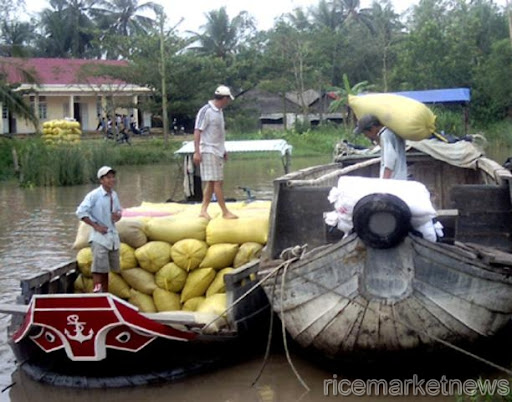Thursday, 14 April 2011
Japan Rice Buying May Outstrip Supply on Hoarding, Marubeni's Shibata Says
 Japanese consumers may almost double rice purchases this fiscal year, driven in part by contamination “rumors” surrounding the nation’s worst earthquake and nuclear disaster, as demand outstrips crimped domestic production.
Japanese consumers may almost double rice purchases this fiscal year, driven in part by contamination “rumors” surrounding the nation’s worst earthquake and nuclear disaster, as demand outstrips crimped domestic production.
Hoarding may result in purchases of as much as 15 million metric tons, from about 8 million tons last year, making it impossible for Japan’s farmers to meet demand after a quake- generated tsunami washed over paddies in an area representing 18 percent of the country’s output, said Akio Shibata, head of the research unit at Marubeni Corp., in an interview in Tokyo.
“Stockpiles may be depleted, creating a shortage and boosting imports,” Shibata said. Effects of the March 11 quake and tsunami, which swept aside machinery and damaged farms in Japan’s northeast, could last “for years,” he said.
Radiation leaking from the damaged Fukushima Dai-Ichi power plant spurred the government to restrict shipments of milk, vegetables and fish produced in the region on contamination concerns. Japan raised the severity rating of its nuclear crisis to the highest level today, matching the 1986 Chernobyl disaster, as rising radiation prompted the government to widen the evacuation zone and aftershocks rocked the country.
Rice production in Fukushima and neighboring Ibaraki, Miyagi and Iwate prefectures amounted to 1.56 million tons last year, out of the country’s total of 8.5 million tons.
Japan’s largest earthquake on record and tsunami struck the nation’s eastern half, disrupting food distribution and creating a temporary rice shortage as consumers rushed to buy the staple. Per-capita consumption of rice in Japan is about 10 kilograms a month, and demand is doubling as consumers try to hoard supplies, Shibata said yesterday.
Radioactive Paddy
Japan will prevent rice-planting in paddy fields near Fukushima that contain radioactive cesium of more than 5,000 becquerel per kilogram, which leaked from the nuclear power plant, in a bid to safeguard the nation’s food supplies.
The government will decide which areas will be barred from rice planting this year after analyzing all the data on soil samples tested for radioactivity, Agriculture Minister Michihiko Kano said April 8. Japan is testing 150 samples from farmland in areas hit by radiation leakage from the plant.
Rice Stockpiles
Japan’s food-rice stockpiles held by the private sector and the government are forecast to climb 2.5 percent to 3.24 million tons by the end of June because of declining consumption, the agriculture ministry said in July last year. The volume would be the biggest in eight years and equivalent to almost five months of consumption.
The ministry also held 880,000 tons of foreign rice in inventories at the end of October as the nation imports 770,000 tons a year from overseas under a 1993 World Trade agreement to give minimum-market access to exporting countries.
Japan may increase rice imports if hoarding by consumers continues, Shibata said. If rice supplies from overseas aren’t sufficient, Japan may also increase wheat imports to meet consumer demand for grains, he said, without elaborating.
Japan expects to import 5.11 million tons of food wheat in the year to March 31, 2012, compared with 5.39 million tons last fiscal year, the ministry forecast on March 30.
Purchases are expected to decrease after jumping 11 percent last fiscal year to the highest level in at least six years, the ministry said. Japanese flour millers accelerated purchases from December to February amid concern over rising prices and tightening supplies, according to Charlie Utsunomiya, director at the Tokyo office of U.S. Wheat Associates.
Japan’s Nuclear and Industrial Safety Agency raised the rating of the Fukushima nuclear accident to 7, a spokesman said at a news conference in Tokyo today. The accident at the Fukushima Dai-Ichi station was previously rated 5 on the global scale, the same as the 1979 partial reactor meltdown at Three Mile Island in Pennsylvania.
The stricken nuclear plant, located about 220 kilometers (135 miles) north of Tokyo, is leaking radiation in Japan’s worst civilian nuclear disaster. Tokyo Electric Power Co.’s plant has withstood hundreds of aftershocks, and the government widened the surrounding evacuation zone yesterday.

This post was written by: HaMienHoang (admin)
Click on PayPal buttons below to donate money to HaMienHoang:
Follow HaMienHoang on Twitter




0 Responses to “Japan Rice Buying May Outstrip Supply on Hoarding, Marubeni's Shibata Says”
Post a Comment